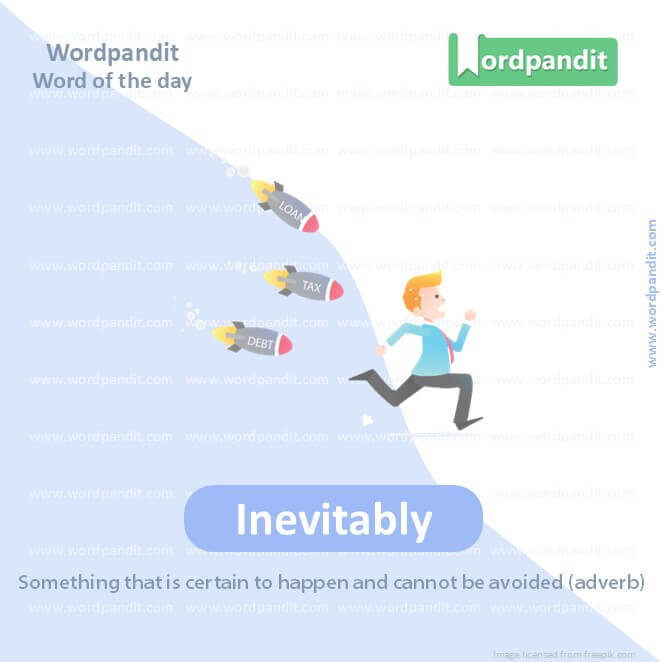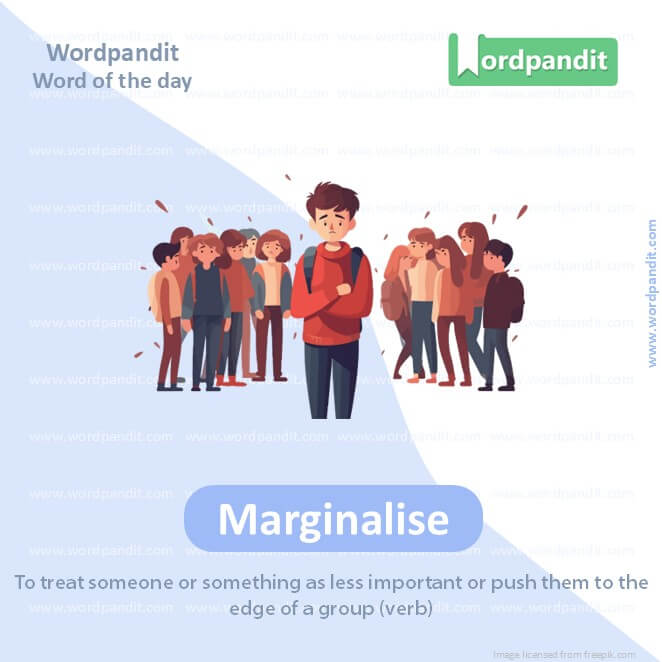Daily Vocabulary Words: Enhance Your Lexicon with Leading Newspapers & Publications
Welcome to the Daily Vocabulary section at Wordpandit!
Our mission is straightforward: to bring you essential vocabulary words featured in top newspapers and publications worldwide. By focusing on words you’ll encounter in renowned sources, we aim to help you enhance your vocabulary effectively and practically.
Our selection includes words from:
– The New York Times
– The Washington Post
– Scientific American
– BBC
– The Guardian
– Psychology Today
– Wall Street Journal
– The Economist
– The Hindu
– The Times of India
– The Economic Times
– Hindustan Times
– Live Mint
– The Indian Express
– And many more.
We are committed to your vocabulary development. Simply visit this section regularly and explore the daily posts. This is your go-to repository for commonly used words, providing significant practical benefits by familiarizing you with vocabulary from the leading publications listed above.
Make it a habit to visit our website daily and expand your lexicon with words from top newspapers and publications.
WORD-1: Repercussions
CONTEXT: When civilian groups resort to violence against state actors without repercussions, one has to call into question the maintenance of law and order in the State of Manipur.
SOURCE: The Hindu
EXPLANATORY PARAGRAPH: “Repercussions” are the effects or results that happen because of something you did, like if you spill water, the repercussions are the mess and cleanup. It’s what happens as a result of an action.
MEANING: The effects or consequences of an action or event (noun).
PRONUNCIATION: rep-uh-KUH-shuhns
SYNONYMS: Consequences, effects, aftermath, results, impact
USAGE EXAMPLES:
1. The repercussions of the decision were felt across the company.
2. He faced serious repercussions for breaking the rules.
3. The environmental repercussions of the spill were significant.
4. They discussed the potential repercussions of the new policy.

WORD-2: Inevitably
CONTEXT: Such changeover at the top will inevitably raise questions about the focus of the Quad. This is billed as a leader-level grouping, after all, and leaders want to leave their mark.
SOURCE: The Hindu
EXPLANATORY PARAGRAPH: Think of a time when you’re playing outside, and the sky is getting darker with clouds. Soon, it will rain. You can’t stop the rain from coming, no matter what. It *will* happen. When something is sure to happen and you can’t stop it, we say it happens “inevitably.”
MEANING: Something that is certain to happen and cannot be avoided (adverb).
PRONUNCIATION: in-EV-it-uh-blee
SYNONYMS: unavoidably, surely, certainly, predictably, inescapably
USAGE EXAMPLES:
1. Inevitably, the sun sets at the end of the day.
2. If you don’t study, you will inevitably get a low score on the test.
3. The traffic jam was inevitably caused by the heavy rain.
4. With so much snow, the school closure was inevitable.

WORD-3: Truncated
CONTEXT: The then Chief Minister Y.S. Jagan Mohan Reddy came up with the idea of three capitals, including Amaravati as the Legislative Capital that would be a truncated one having only the Legislature Complex at its current location which is about 21 km from Vijayawada city.
SOURCE: The Hindu
EXPLANATORY PARAGRAPH: Imagine cutting a long ribbon in half. The piece you cut is now shorter. When something is made shorter, like a story or a line, we say it has been “truncated.” It means the end part has been cut off to make it smaller or shorter.
MEANING: To shorten by cutting off part of something (verb).
PRONUNCIATION: TRUN-kay-ted
SYNONYMS: shortened, cut, reduced, abridged, trimmed
USAGE EXAMPLES:
1. The long speech was truncated due to time limits.
2. The text was truncated on my screen, so I couldn’t read the end of it.
3. They had to release a truncated version of the movie to fit the time slot.
4. The class discussion was truncated by the school bell.

WORD-4: Marginalise
CONTEXT: The NEP 2020 not only continues to marginalise English but also gives a disproportionate thrust to regional languages, inadvertently fuelling regional identity politics.
SOURCE: The Hindu
EXPLANATORY PARAGRAPH: Imagine if a group of kids is playing a game, but they don’t let one kid join. They make that kid feel left out or less important. When someone is pushed to the side and not treated as important, that’s called being “marginalized.”
MEANING: To treat someone or something as less important or push them to the edge of a group (verb).
PRONUNCIATION: MAR-jin-uh-lize
SYNONYMS: sideline, exclude, ignore, isolate, diminish
USAGE EXAMPLES:
1. Some groups feel marginalized in society because their voices are not heard.
2. The new policy could marginalize smaller businesses.
3. We must not marginalize people based on their background or beliefs.
4. He felt marginalized by his classmates when they wouldn’t include him in the game.
WORD-5: Incarcerated
CONTEXT: They continue to constitute three-fourths of the total number of incarcerated people in India.
SOURCE: The Hindu
EXPLANATORY PARAGRAPH: Imagine being locked in a room where you can’t leave, like being in time-out but for a much longer time. When someone does something really bad and gets sent to jail, they are “incarcerated.” It means they are put in a place where they can’t leave as a punishment.
MEANING: To be imprisoned or confined (verb).
PRONUNCIATION: in-KAR-suh-ray-ted
SYNONYMS: imprisoned, jailed, detained, confined, locked up
USAGE EXAMPLES:
1. He was incarcerated for his role in the robbery.
2. The country has many incarcerated individuals due to strict laws.
3. The judge sentenced him to be incarcerated for five years.
4. After being incarcerated, he worked to turn his life around.

WORD-6: Abolitionist
CONTEXT: If the objective behind the death penalty is not fulfilled, the carceral politics of sexual violence must be dismantled by infusing abolitionist feminism.
SOURCE: The Hindu
EXPLANATORY PARAGRAPH: Imagine a group of people working hard to stop something that’s unfair, like making sure everyone can play and no one is left out. In history, there were people called “abolitionists” who worked to stop slavery because they believed everyone should be free.
MEANING: A person who works to end or stop something, especially slavery (noun).
PRONUNCIATION: ab-uh-LISH-un-ist
SYNONYMS: activist, reformer, campaigner, protester, advocate
USAGE EXAMPLES:
1. The abolitionists fought to end slavery in the 19th century.
2. She was a passionate abolitionist who dedicated her life to justice.
3. The abolitionist movement spread across the country.
4. He wrote books supporting abolitionist ideas.
WORD-7: Fraternity
CONTEXT: They also need to provide support to families of rape survivors, particularly minor siblings, if any, in terms of their access to education and resources, and take part in community building and a realization of fraternity to ensure their dignity that the Indian Constitution upholds.
SOURCE: The Hindu
EXPLANATORY PARAGRAPH: Imagine having a group of friends who are like your brothers, even though they’re not part of your family. This group sticks together, helps each other, and shares a special bond. That’s what a “fraternity” is, a close group of people who support each other, like family.
MEANING: A group of people who share common interests and have a close bond, often like brothers (noun).
PRONUNCIATION: fruh-TUR-ni-tee
SYNONYMS: brotherhood, fellowship, association, club, society
USAGE EXAMPLES:
1. He joined a fraternity in college to make new friends.
2. The firefighter fraternity supports its members during tough times.
3. The fraternity organized a charity event for the community.
4. Their fraternity welcomed new members with open arms.
WORD-8: Gullibility
CONTEXT: Conspiracy theories are seemingly everywhere. To explain their prevalence, many commentators point to the gullibility of conspiracy theorists.
SOURCE: Psyche
EXPLANATORY PARAGRAPH: Think about when someone tricks you into believing something silly, like saying there’s a monster under the bed, and you believe it. When someone believes things too easily, even when they’re not true, we call that “gullibility.”
MEANING: The tendency to believe things too easily or be easily fooled (noun).
PRONUNCIATION: gull-uh-BIL-ih-tee
SYNONYMS: naivety, credulity, trustfulness, innocence, susceptibility
USAGE EXAMPLES:
1. His gullibility made him an easy target for pranks.
2. She laughed at her own gullibility after falling for the joke.
3. Gullibility can lead people to believe in false rumors.
4. He warned her about the dangers of gullibility in the online world.

WORD-9: Epistemic
CONTEXT: This ‘epistemic exclusion’ can lead the insight-hungry to seek out alternative views of medicine, often involving conspiratorial elements (centering around cover-ups by ‘big pharma’, for example).
SOURCE: Psyche
EXPLANATORY PARAGRAPH: When you learn something new, like why the sky is blue or how plants grow, you’re gaining knowledge. The word “epistemic” is about things related to learning or knowing, like how we find out what is true or false.
MEANING: Relating to knowledge or the way we know things (adjective).
PRONUNCIATION: ep-uh-STEE-mik
SYNONYMS: cognitive, intellectual, theoretical, conceptual, analytical
USAGE EXAMPLES:
1. Epistemic questions focus on how we know what we know.
2. The professor gave a lecture on the epistemic value of science.
3. They debated the epistemic limits of human understanding.
4. His research explores the epistemic role of intuition.
WORD-10: Resonating
CONTEXT: That will allow them to challenge us at the just-right level – eventually coming up with new, resonating metaphors and pointed questions.
SOURCE: Psyche
EXPLANATORY PARAGRAPH: Think about when you hear a sound, like a bell, and the sound keeps going and feels strong even after it stops ringing. When something makes you feel that way, like a story or a song that stays in your mind, we say it’s “resonating.” It means it makes you feel or think deeply.
MEANING: Producing a deep, lasting effect or sound that continues (verb).
PRONUNCIATION: REZ-uh-nay-ting
SYNONYMS: echoing, reverberating, vibrating, connecting, ringing
USAGE EXAMPLES:
1. The song’s message kept resonating with me long after I heard it.
2. His speech resonated deeply with the audience.
3. The sound of the violin resonated throughout the room.
4. The movie’s emotional themes resonated with viewers of all ages.













